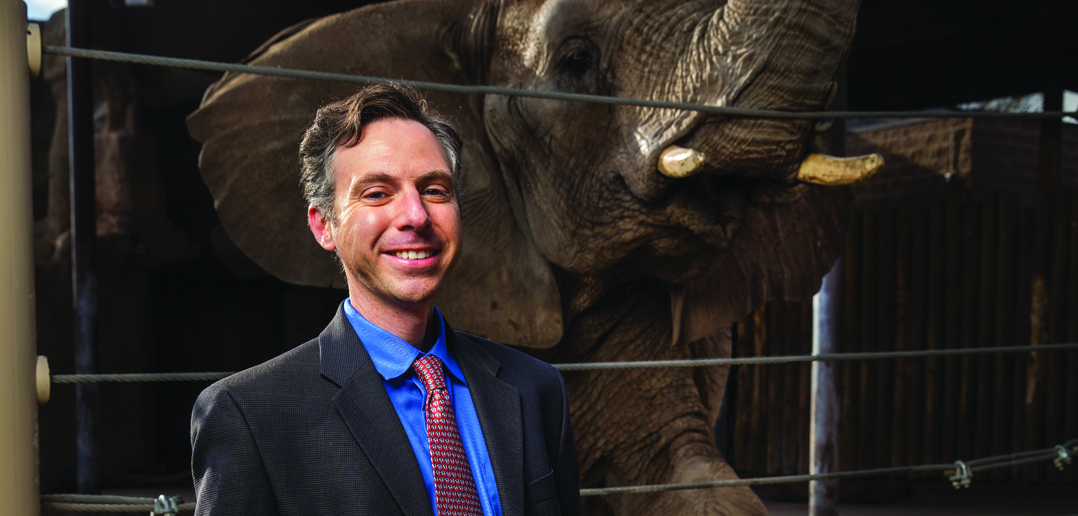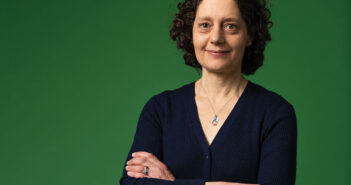In elephants’ cancer-resistant genes, an oncologist sees new hope for people.
A few years ago pediatric oncologist Joshua Schiffman ’96 MD’00 learned an astonishing fact. Elephants have an extraordinarily low rate of cancer, despite their enormous size and long lifespan.
An investigator at Huntsman Cancer Institute at the University of Utah, and a childhood cancer survivor himself, he’d dedicated his career to understanding why people get cancer and to caring for sick and dying kids, like the doctors who’d once cared for him.
He’d been studying human hereditary cancer syndromes, focusing on a tumor-suppressing gene that, when absent, heralds a nearly 100-percent cancer risk. Elephants, Schiffman learned, have 40 copies of the gene. “I almost fell out of my seat when I heard that,” he says. Over its lifetime, an elephant’s chance of dying from cancer is less than 5 percent.
The finding turned his research on its head. “What if we focus on who’s getting less cancer, not who’s getting more?” he asked himself.
Still, he didn’t see how this quirk of elephant genetics could translate into anything useful for humans. “People always would say, how will you actually use this discovery to help people?” Schiffman says. “I would say there’s not really a way to do that. Maybe one day we’ll find a drug that mimics the effects, but there’s no way of actually putting an elephant gene into people.”
That was before he met Avi Schroeder, PhD, a nanotechnologist in Israel. Their labs have since joined forces, and their goals are not small. “I want a world where no one has to go through what I went through, or what my patients go through,” Schiffman says. “Maybe one day, we can prevent cancer.”
Personal Touch
Many physicians are spurred into the field of medicine by a personal encounter with disease; many others because they have a doctor in the family. Schiffman first was inspired by his dad, Fred Schiffman, MD, a hematologist/oncologist and the Sigal Family Professor of Humanistic Medicine at Alpert Medical School. “He’s always there for his patients and his colleagues,” Josh Schiffman says. “When he goes kayaking, he puts his phone in a pouch so patients can reach him, or another physician can call him up.”
When Josh was diagnosed with Hodgkin’s lymphoma, at age 15, Fred initially sought help from his colleague Edwin Forman, MD ’56, P’92, who practiced pediatric hematology/oncology at Rhode Island Hospital, and then Hasbro Children’s Hospital, for more than 40 years. Josh, who ultimately was treated at Dana-Farber Cancer Institute, in Boston, survived his illness “very determined to be like Ed Forman,” he says. “I wanted to learn to be a good doctor humanistically and spiritually—to sit on the bed, hold a patient’s hand, and look them in the eyes.”
Schiffman enrolled at Brown in the Program for Liberal Medical Education, studying biology, psychology, and animal behavior as an undergraduate and spending his summers as a camp counselor, including working with seriously ill kids at the Hole in the Wall Gang Camp. In medical school he took an elective with Forman. “[Josh] was just wonderful with patients. Obviously he could identify with the patients and the families,” says Forman, now a professor emeritus of pediatrics at Alpert Medical School who still sees hematology patients at Mount Sinai and Elmhurst hospitals in New York City.
But Forman says he also witnessed Schiffman’s “terrific curiosity and independent creative thinking.” He recalled a 5-year-old patient who appeared to have a bone marrow disease, yet Schiffman insisted that because the boy had recently been bitten by a tick, they should order a blood test for ehrlichiosis instead of a marrow biopsy. “So we did both. The marrow came back normal, and the ehrlichiosis was positive,” Forman says. “A paper came out of it,” in the Journal of Pediatric Hematology/Oncology, in 2001.
“His aggression is not the kind that would ever turn anyone off,” Forman says, chuckling as he remembered Schiffman’s persistence. “It’s, hey, can we think about this in a different way?” He adds, “He’s always giving credit to others. … He credits me with more than I deserve.”
Schiffman says, “Ed Forman and my dad taught me your patients guide your career. You’ll learn more from your patients than from any medical textbook.” After graduating, Schiffman moved across the country for a residency and pediatric oncology fellowship at Stanford. During his first year as a fellow he saw a 4-year-old girl who had acute lymphoblastic leukemia and Li-Fraumeni syndrome, an inherited disorder that dramatically increases the risk of developing cancer, often at a young age. “I’d never heard of it,” he says.
As long as Schiffman could remember, he’d wanted to become a pediatric palliative care physician. But in that young patient, and her rare genotype, he found a new calling—at the start of life, instead of the end. “I wanted to know who is at risk for cancer,” he says, “and could there be a way to intervene?”




